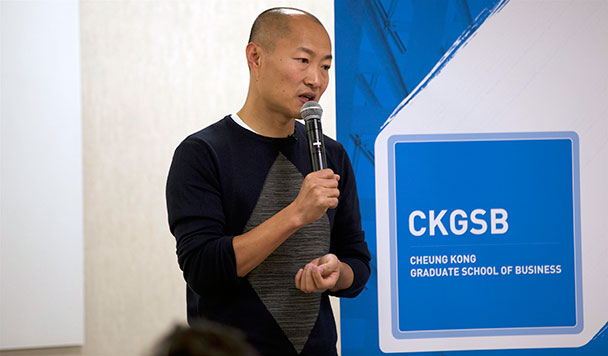Alan Yan, founder of AdChina, the Chinese Internet marketing firm recently acquired by Alibaba Group, told a CKGSB Knowledge Series audience that the online-to-offline (O2O) market remains a “huge” China investment opportunity, despite a shakeout that has raised concerns that the O2O boom is a mirage.
During the February 29 session, “Entrepreneurial Trends in China’s Mobile Advertising: A Returnee’s Perspective,” the big data marketing expert acknowledged that some O2O startups have proven to be undergirded by flimsy fundamentals, causing some worried backers to pull their support. But he said the sector remains a good bet given the solid foundations that underpin many O2O firms.

AdChina Founder Alan Yan speaking at a recent Knowledge Series event
at CKGSB’s New York office
“If there’s a bubble, there’s a bubble,” said Mr. Yan, a former eBay employee who founded Shanghai-based AdChina in 2007 and saw it grow into China’s leading big data marketing technology platform. “But the business model I see in the major sectors in the O2O space is real – it’s real business.”
Diverse services
O2O businesses offer online booking of services as diverse as manicures, food delivery and taxi rides—similar to what is known as on-demand services in the United States. Mr. Yan, who specializes in the efficiency of mobile ads reaching their audiences, told those present at CKGSB’s New York office that while the lure of such services in the US is largely convenience, in China, it is bargains.
Despite the widespread use of O2O apps by Chinese online consumers, turbulence in the Chinese stock market and growing worries about slow economic growth have made venture capitalists uneasy about the high rate at which O2O startups have been burning through cash, and some investors are terminating their stakes.
AdChina has been a tangible representation of Mr. Yan’s belief that in modern marketing, “the key is to understand the audience – understanding who the audience is, where can you find them, how can you reach them and how do you convert them from audience to customers.”
Alibaba acquired a controlling stake in AdChina for an undisclosed sum in January 2015 to make the AdChina platform a core part of Alibaba’s $10 billion big data marketing services business. Since going public in a record $25 billion initial public offering on the New York Stock Exchange, Alibaba has faced a challenge finding ways to shift its lucrative advertising platform to mobile apps from personal-computer websites.
“AdChina plays a role in helping Alibaba to expand their ad revenue from the onsite business to offsite,” said Mr. Yan, who holds an MBA degree from MIT and a Bachelors of Science degree from Ocean University of Qingdao.
Alibaba’s ad business involves selling search-linked ads. Merchants selling their products on Alibaba’s Taobao marketplace, for example, can participate in auctions of search keywords – in a similar way to spending on Google’s search-linked advertisements. It also charges for other ad spaces on its e-commerce platforms’ home pages.
In an interview prior to the session’s start, Mr. Yan downplayed the sometimes-heard claim that the ease with which marketers today can harvest an abundance of inexpensive mobile data actually poses a problem when it comes to decoding it.
“The key thing is whether you are able to identify users – unique users, returning users – and across all devices: mobile phone, iPad, any portable Internet terminal devices as well as smart TV and PC,” Mr. Yan said. “Technically, analyzing big data is not a big issue. It’s really about different techniques and technologies.”
Mobile users
Chinese marketers are beating their US counterparts to the punch in prioritizing mobile, causing mobile ads in China to account for half of all platform revenue in the country, Mr. Yan said. Typically, Chinese mobile consumers far outspend their US counterparts – which fits with China’s status as home to the world’s largest mobile user base.
“You have to be a mobile-first player if you are an Internet company,” Mr. Yan said. A digital strategy also is a must for consumer packaged goods and other traditional companies.
“Digital is the major channel to reach consumers,” Mr. Yan said. “But mobile is the most important piece, not only because of the vast number of mobile users, but because a mobile device is the one thing that people have with them constantly.”
About the Knowledge Series
Knowledge Series events aim to disseminate advanced knowledge and perspectives related to China and promote in-depth dialogue in Chinese, Asian and global academic and business circles. Series memberships are available for young professionals, VIPs and corporations.
For more information, please contact Julie Zhu at juliezhu@ckgsb.edu.cn or +1-646-627-7729.